Tl;dr [edit]
- Granular evidence from my own high school indicates that many, and likely most, of the smartest students US college applicants (proxied by SAT) will get rejected from:
- any particular top school they apply to
- all of Harvard, Stanford, MIT, Yale, and Princeton (as an arbitrary example)
- There’s more overlap between “great,” “good,” and “decent” schools in terms of students’ academic capability than one might expect (and I certainly expected), mostly because the top ~quarter of students at dozens of schools look pretty similar.
- Therefore
- The base rate of acceptance to any top US school among very top (99.5th+ percentile SAT-scoring, which is >median at all such schools) students, is low, maybe on the order of 20%; Phrased another way, using Princeton as a random example:
- Scott Aaronson's rejection at 15, “from all five of "HYPMS" despite a 1600 SAT and a single-author paper in a major computer science conference” is an illustrative example, not an exception to it.
Note for the Forum:
I've decided to share this here because it seems relevant to EA hiring and community building strategy and practice.
I don't address/argue the normative claim that EA should focus less on college rank at the individual (e.g., hiring) and/or community (e.g., which schools' EA groups to invest more resources in developing) levels, but that would indeed be a non-crazy takeaway if the post makes you update in the direction I expect it to, on average!
Anyway, here's the post:
Intro
First, a few points to get out of the way:
1) High-minded (but totally sincere) disclaimer
- Intelligence isn’t a moral virtue.
- One’s intelligence is attributable almost entirely to luck of one kind or another, and thus is a form of privilege like any other.
- In a more just world, being called “unintelligent” or even “stupid” wouldn’t bite any more than being called “colorblind,” and being told that you’re “brilliant” wouldn’t leave anyone gushing with pride.
2) No bullshit faux modesty
This post is neither about me nor for me, but it is inspired by my experience, and it would be silly and a bit disingenuous to pretend otherwise. In short:
- My high school transcript was pretty damn good—almost as good as one can get in terms of grades, course rigor, and AP/SAT test scores.
- I got rejected from all five Ivy-tier colleges to which I applied (and yes, I probably should have applied to more.)
3) This is (probably) totally fine - at least at the individual level
- It at least might be totally appropriate that I got rejected; there’s no law that says colleges are “supposed” to be a ruthless academic meritocracy.
- I personally find my own set of rejections mildly selfishly unfortunate, but not a moral injustice.
- I got into some excellent colleges, including Georgetown, which is where I graduated a few months back and was extremely very fortunate to attend. Hoya Saxa!
- I could be convinced that, in fact, it was some sort of personal injustice, but if so I’d nonetheless find it a relatively quite minor one.
- Upper middle class ivy rejects like me are doing just fine.
- Even at the societal level, such a blemish on the meritocratic veneer of higher education itself isn’t an issue. What might be, however, are individuals’ (e.g., high school me), groups’ (e.g., performance-focused organization) or society’s failure to grasp the situation. All this is to say that I’m trying to get some facts on the table so they can be recognized—not (necessarily) so they can be “corrected.”
4) A key assumption: test scores and intelligence
For this post, I’m going to take as given that:
- SAT scores are a pretty good proxy for intelligence, and
- Intelligence (even when proxied by a single number a lá IQ) is a meaningful and important individual-level characteristic.
A lot of ink has spilled on these topics, and I’m sure as hell not going to add anything important to those object-level debates ¯\_(ツ)_/¯
If you think this is wrong, this post is likely going to seem wrong or misguided. Sorry. Anyway, on to the substance!
Forbidden knowledge
I’m also writing this post because the information I’m going to present isn’t publicly available - at least to the best of my knowledge. I’m only able to access it because my Naviance account from high school
- (somehow) hasn’t been disabled, and
- gives me access to micro-level college admissions data from my high school (alone). Namely, I can see scatterplots like the one below of anonymized individuals’ (weighted) GPA + SAT/ACT scores and college application outcomes.
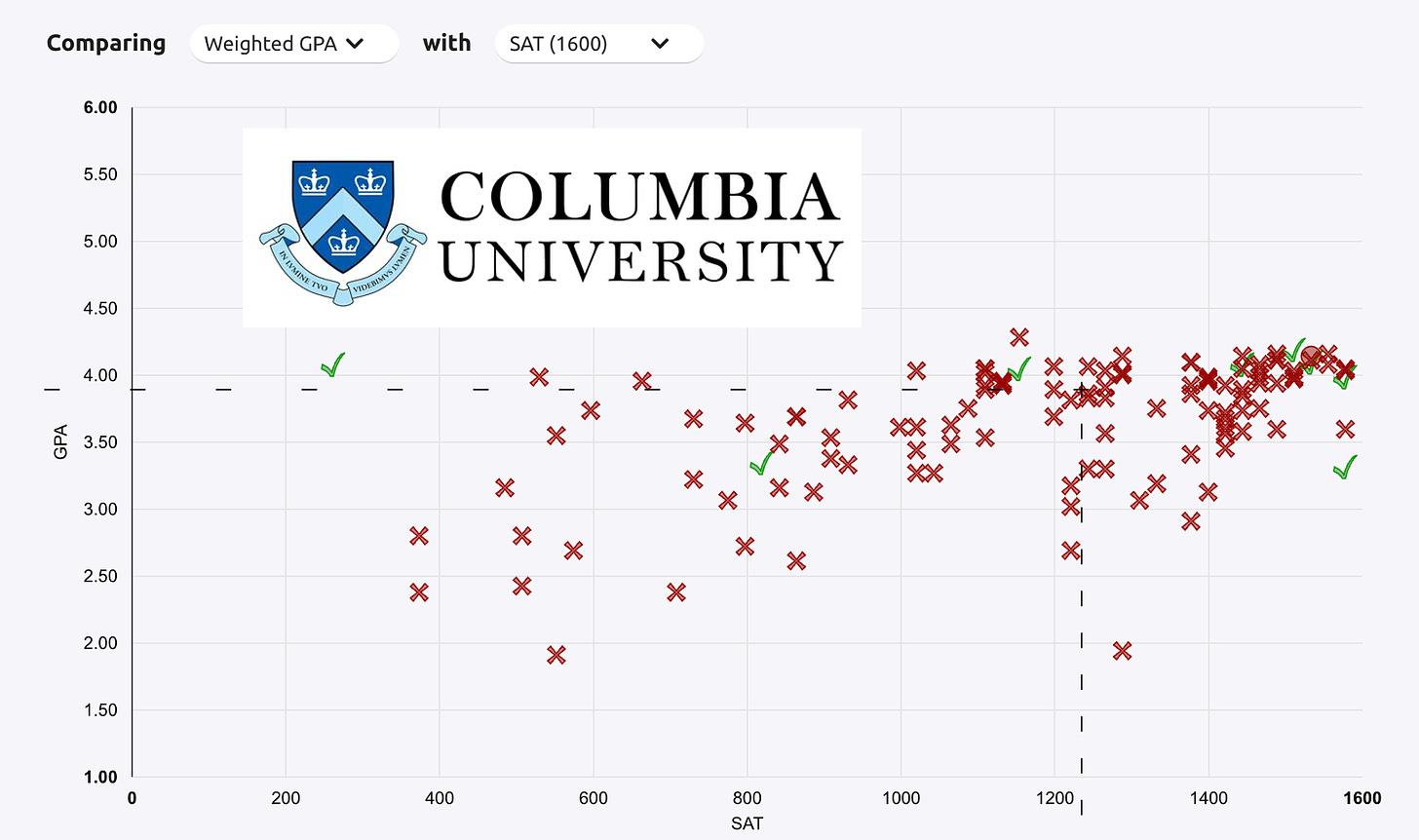
Secret questions
Search online, and you’ll find a thousand statistics tables detailing admissions rates and 25th and 75th SAT score percentiles for students. You’ll find that “selective” colleges are indeed quite selective, and that admissions rates have been falling over time.
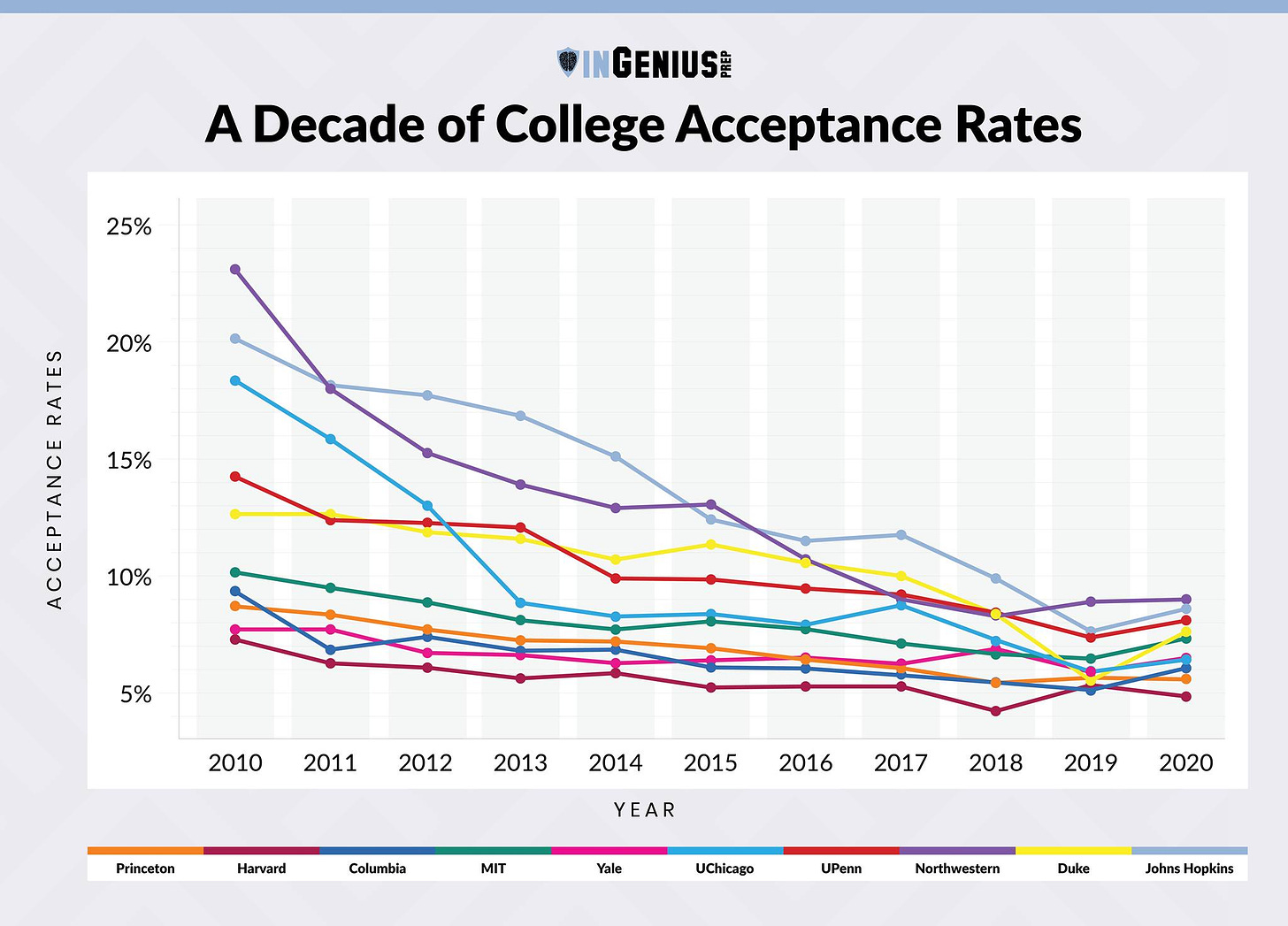
You’ll also find that the students at top schools are really damn smart

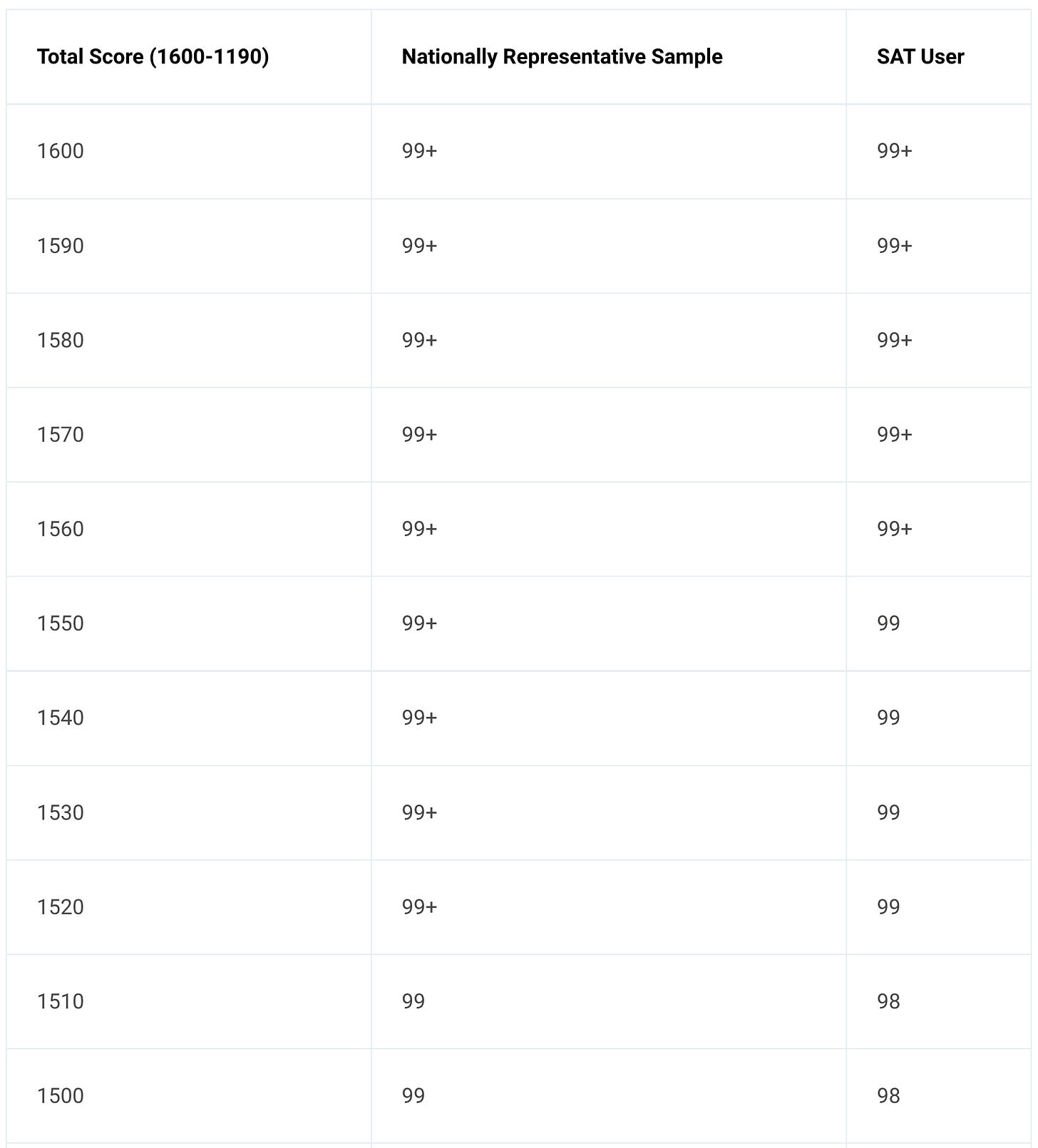
So it’s easy to find info on students who did go to a particular school as well as on the high-level “competitiveness” of different colleges. So we can easily answer the question:
Given that Alex attended MIT, how smart is she likely to be?
But what you won’t find is data on the students who didn’t get into these Ivy-tier schools (or any schools, for that matter). In other words, I don’t know of any way of answering the question:
Given that Alex is as smart as the typical (or 75th percentile, or whatever) MIT (or wherever) student, how likely is she to get accepted to MIT conditional on applying?
Part 1) Bottom-up
Many (most?) of the best students still get rejected: evidence from one upper middle class white kid’s overachieving high school
Not really an unbiased sample, I know, but it’s what I’ve got.
Anyway, I reviewed the scatterplots corresponding to applications to Harvard, Princeton, Yale, MIT, and Stanford, and picked out those from students who:
- Attended my high school, which is a good, reasonably racially diverse public school in a relatively wealthy area with an outsized share of overachievers.
- Applied to college in the four years from 2018 to 2021
- Had an SAT score of at least 1560 or ACT of at least 35,[1] which:
- Seem like pretty good proxies for intelligence
- Correspond to about the 99.5th percentile among test takers
- Are at around the 75th percentile for students attending the of the top-ranked schools in the U.S
Anyway, here’s what I found…
Findings
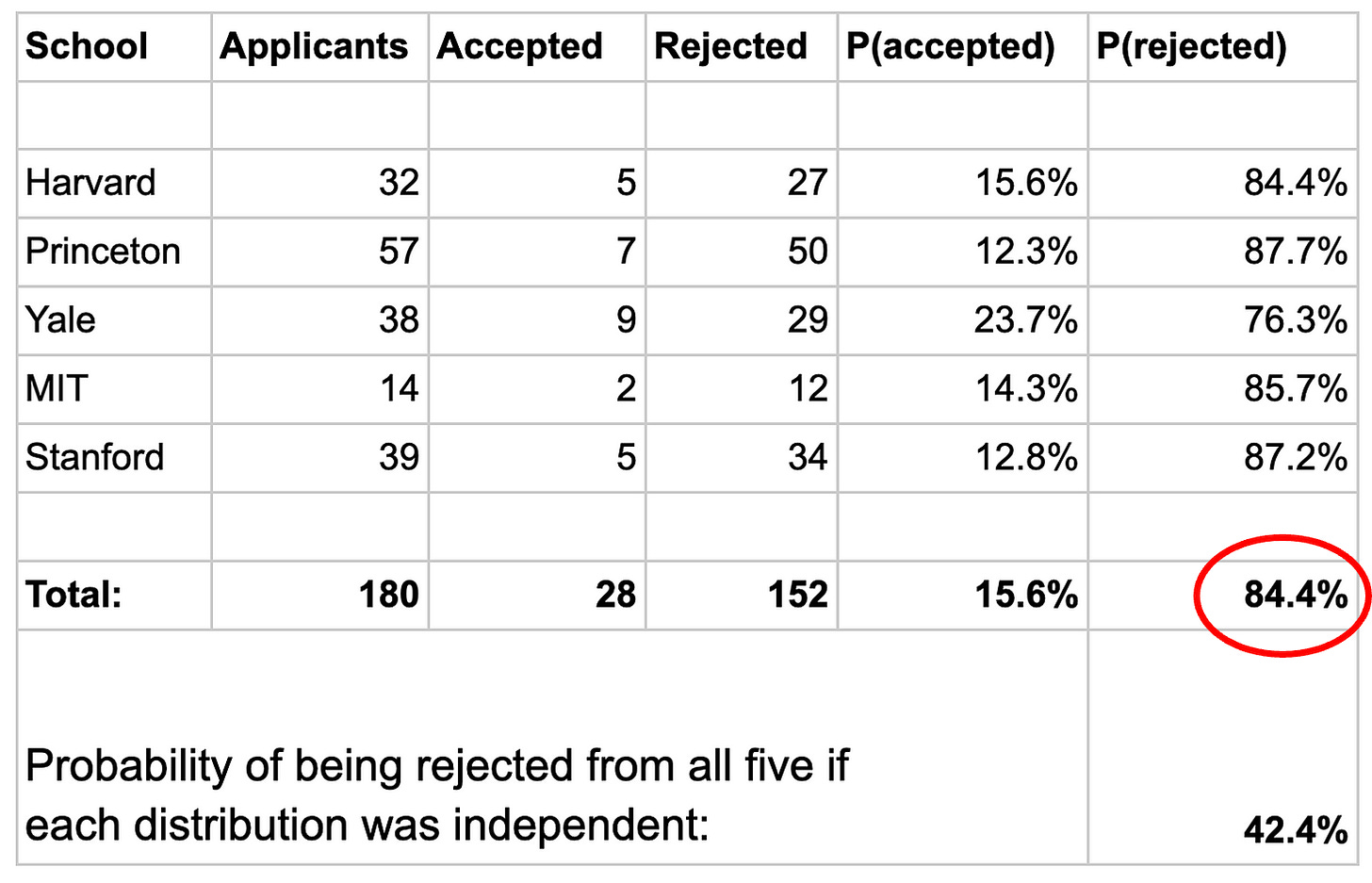
Unfortunately, the most important information can’t really be estimated from the data I have access to without making some big unjustified assumptions,[2] so one number you won't find in the table above is “proportion of high-achievers who get into at least one of the five schools named conditional on applying to all”[3]
That 42.4% bottom-line rejection (or 57.6% acceptance) rate is almost certainly optimistic, since Stanford and Yale are both looking for interesting, diverse applicants who will bring something unique to the table - not each choosing randomly from a hat. A “worse case” lower bound is the maximum single school acceptance rate, which in this data is Yale’s at 24%. Anyway, all things considered, I’d guesstimate the “true” all-school acceptance rate for this population of students at about 35%.
Graphs
Aaaand here they are. Sorry about the weird sizing; the tool isn’t super user-friendly.
All
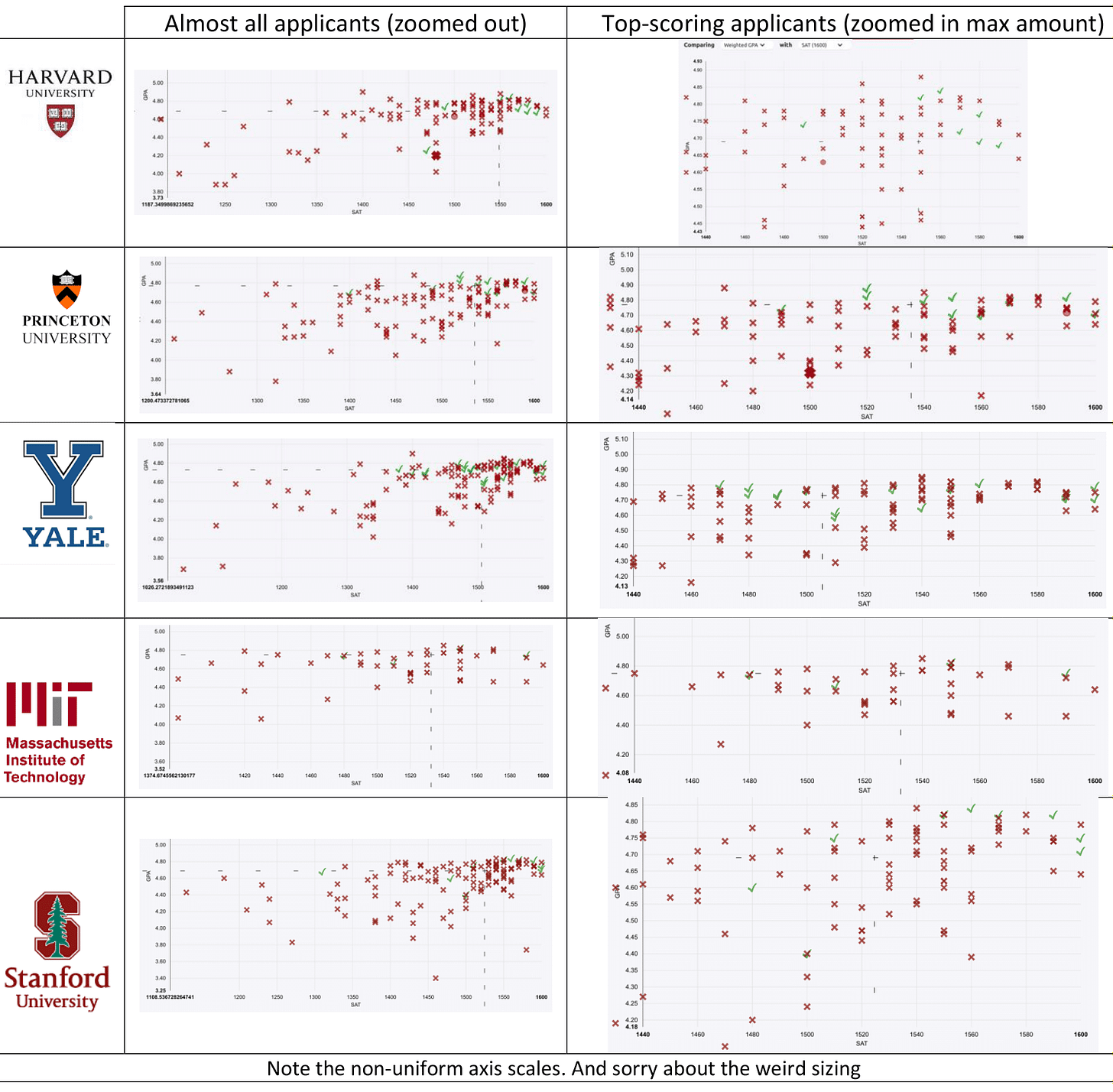
Just the right column for easier viewing
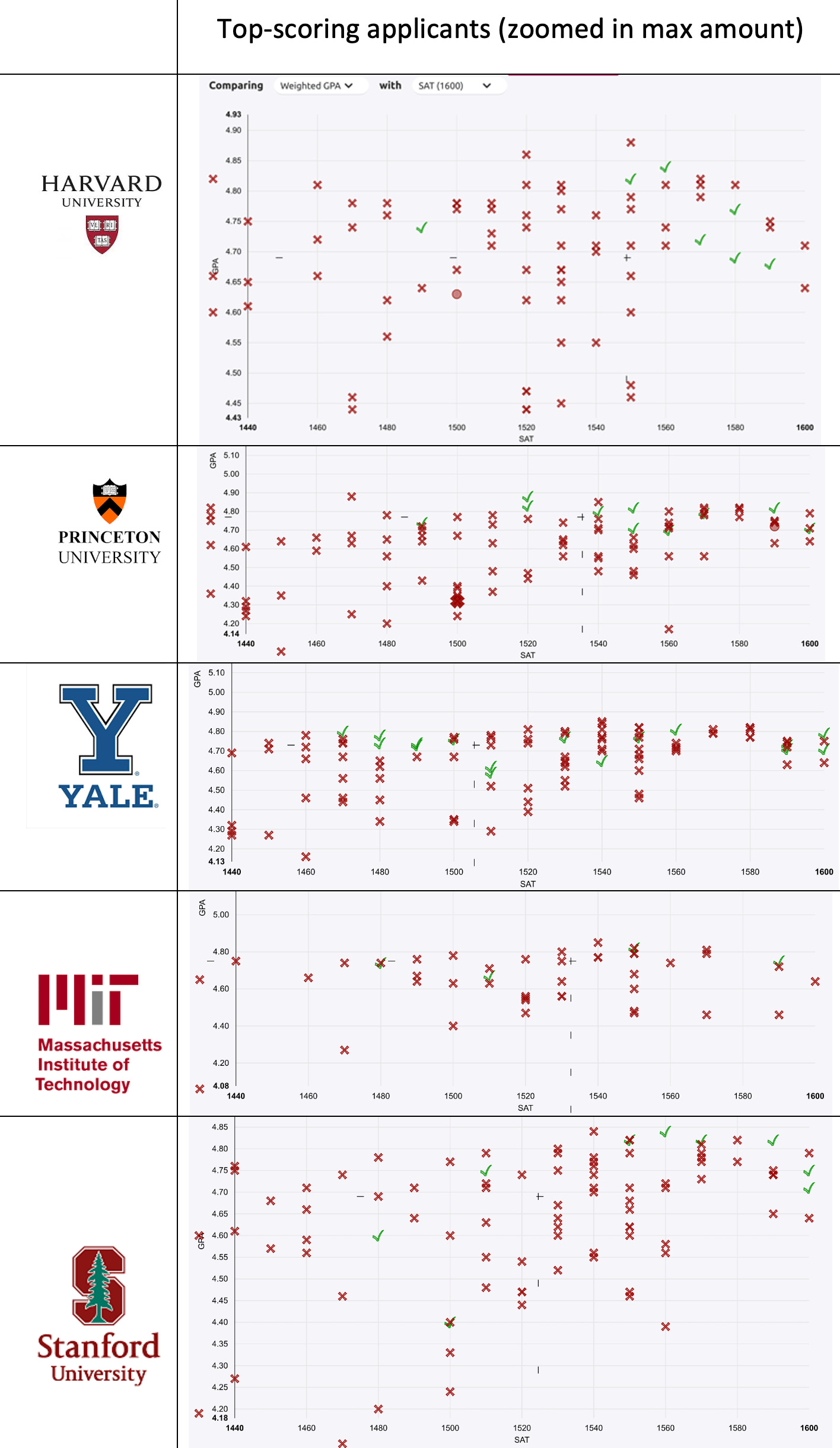
And in case you want to zoom in even more, here’s a Drive link with the ten original, full-res images
Comparisons:
Here are a few plots for still-competitive-not-quite-Ivy colleges:
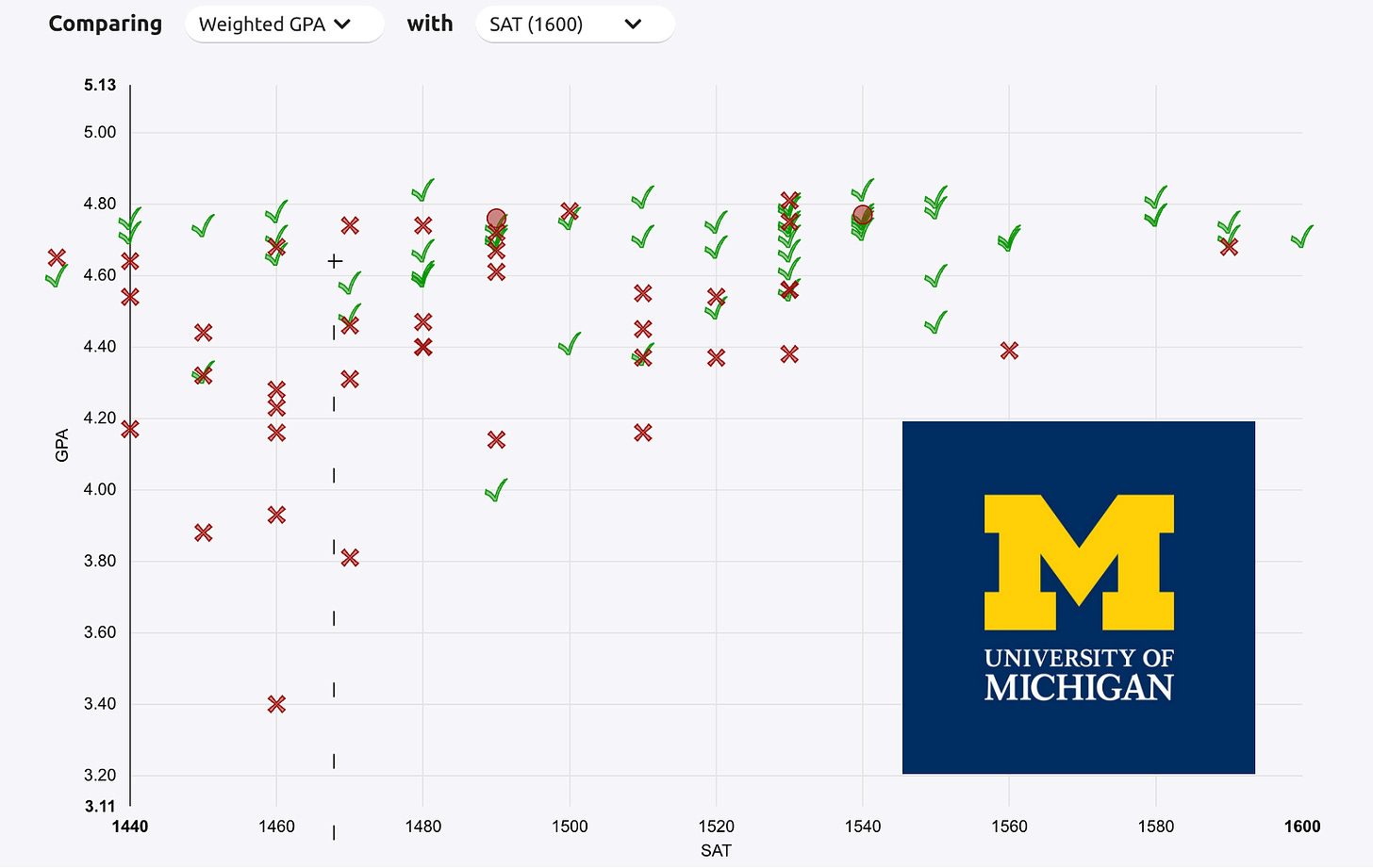
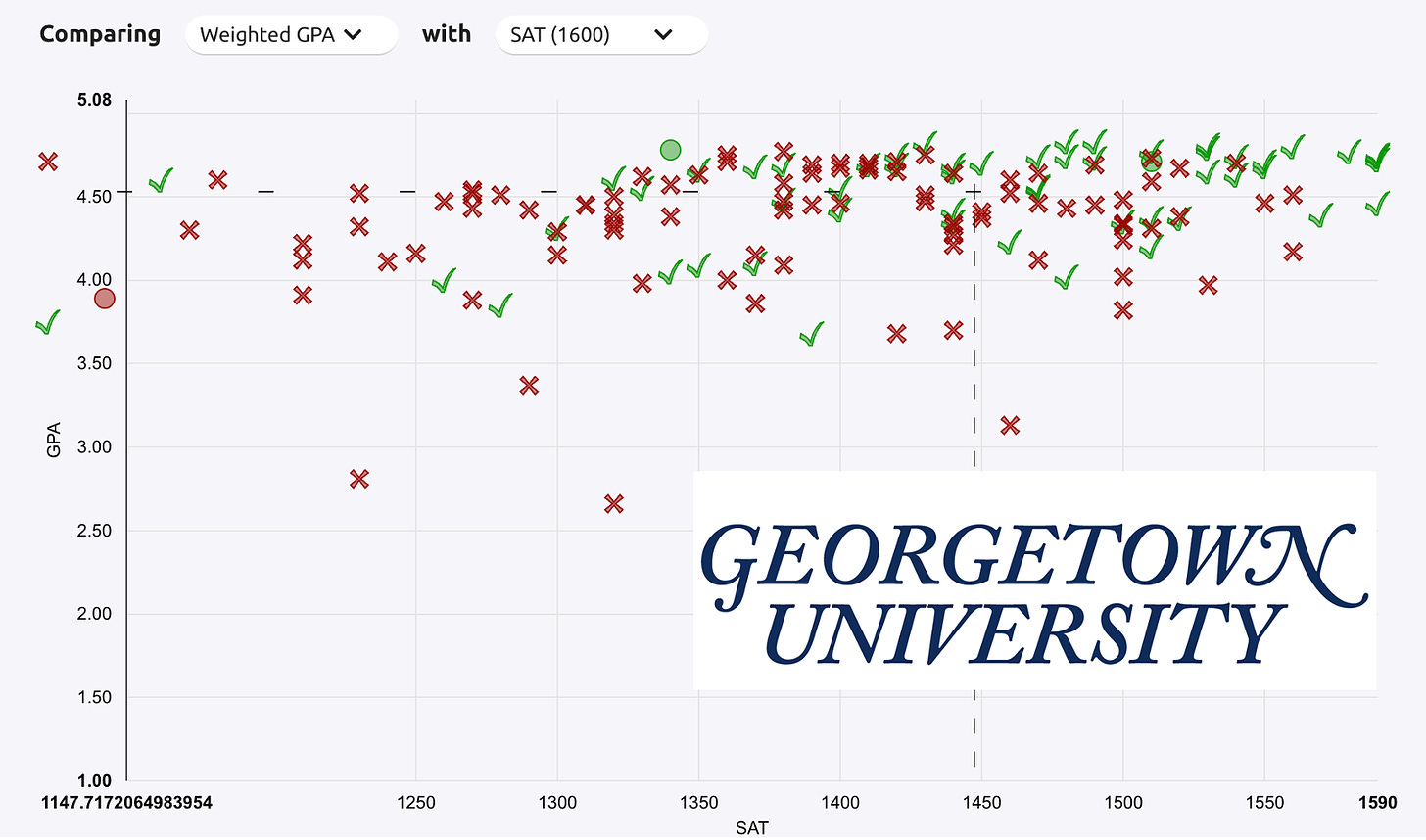
Surprisingly low apparent correlation between test scores and admissions, although at least none of the highest-scorers were denied
…and the most meritocratic school of all (which I very nearly decided to attend).
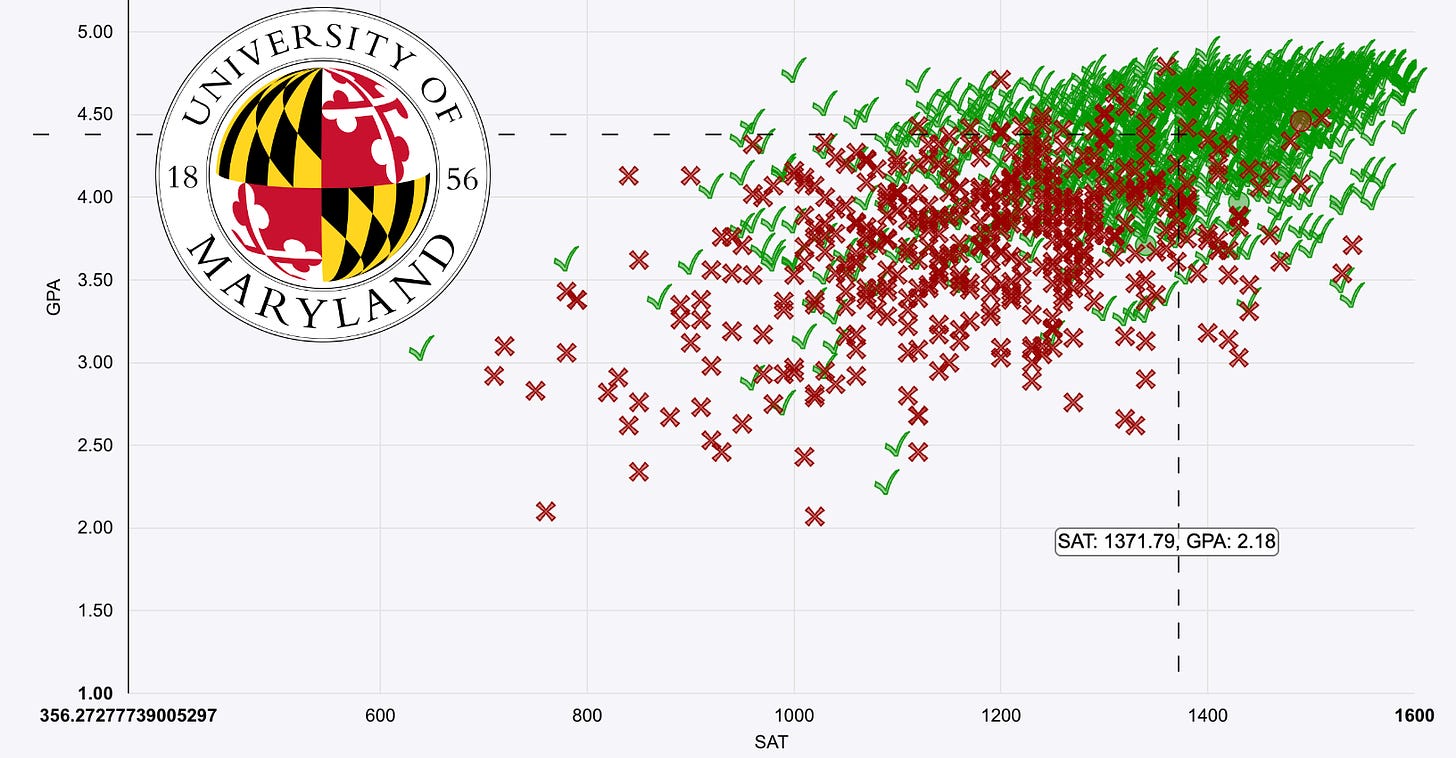
Part 2) Top-down
Where are Ivy rejects going instead? Lots of places.
Looking at the data (see e.g., here or here) you find that different sources give slightly different numbers. But one general theme jumps out regardless, which I’ll block quote for emphasis, as this is really the meat of the post:
Key findings
- The top ranked ~10 “Ivy tier” schools distinguish themselves by enforcing significantly lower variance in student quality than other top ~50 schools, once one takes the scores of their 75th percentile-scoring student as given.
But, these 75th percentile Ivy students scored only very slightly better on the SAT than their counterparts at the next ~40ish schools. This means that:
- ≥25% of students at ~50 colleges scored at least as well as the median Harvard and Princeton student (1510 SAT). The best students at the top (at least) 50 schools have surprisingly similar academic credentials.
≥25% of students at ~85 (!) colleges (see link above) scored at least as well as the 25th percentile Harvard and Princeton students (1460).
The 75th percentile students at the 20th (or so)-highest scoring school (conveniently for me, Georgetown in the data I’m looking at) have SAT scores just 20 points below those of the best-scoring schools (1550 and 1570), which corresponds to raw score difference of about 2 questions (see here) on the 154-question SAT.

To beat a dead horse, make a guess:
What is the rank of the college whose 75th percentile SAT score is equal to Harvard’s 25th percentile?
I’ll give you one screen’s worth of space to actually try answering the question, with a few gifs to keep you entertained.
…..
…..
…..
…..
…..
…..
…..


…..
…..
…..
Answer: University of Maryland, College Park, ranked #59 according to the Powers that Be and with an acceptance rate just about 10x higher than Harvard’s at 49%. Even I was surprised to find this out just now!
Now let’s the other way, starting from what seems a reasonable representative for the old “good but not ~elite~” private universities, Tulane University (party capital of America-of-America—I can vouch[4] in ~beautiful~[5] New Orleans), and working our way toward the élite.
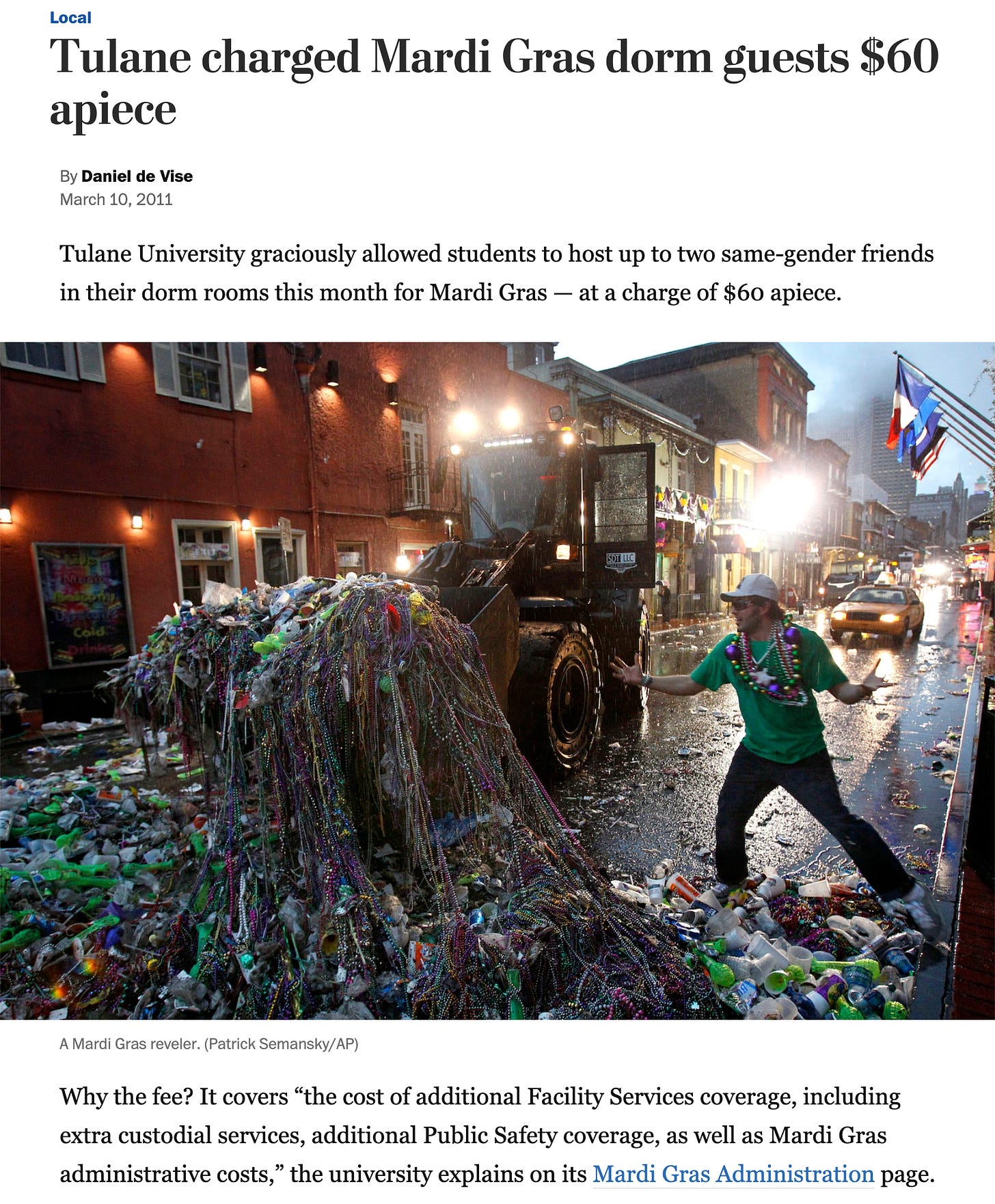
Don’t let the multi-day poly-drug Mardi Gras ragers fool you. Tulane students there are plenty smart, with 75% of them hitting ≥1360 on the SAT (91st percentile among test takers) and 25% getting ≥1470 (97th).
Where else might you find a good chunk of ~equally smart students (if not disposition)? You guessed it:
- Yale (lower quartile of 1470)
- Harvard (1460)
- Princeton (1460)
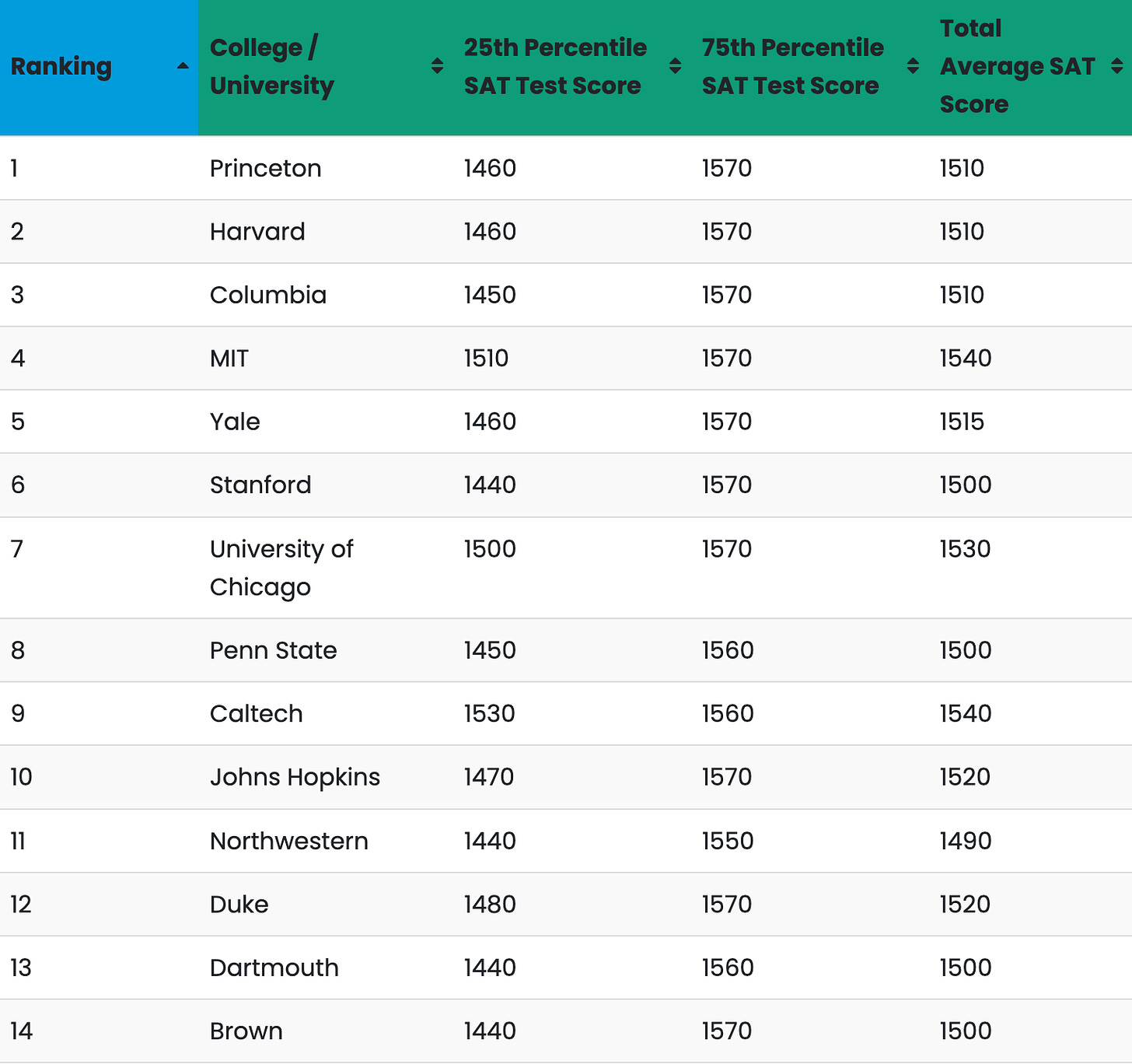
What’s going on?
Best I can tell, the haphazard mix of statistics I’ve thrown at you basically fall out of those “key findings” bullet points above principle, which is presented here as a graphic instead:
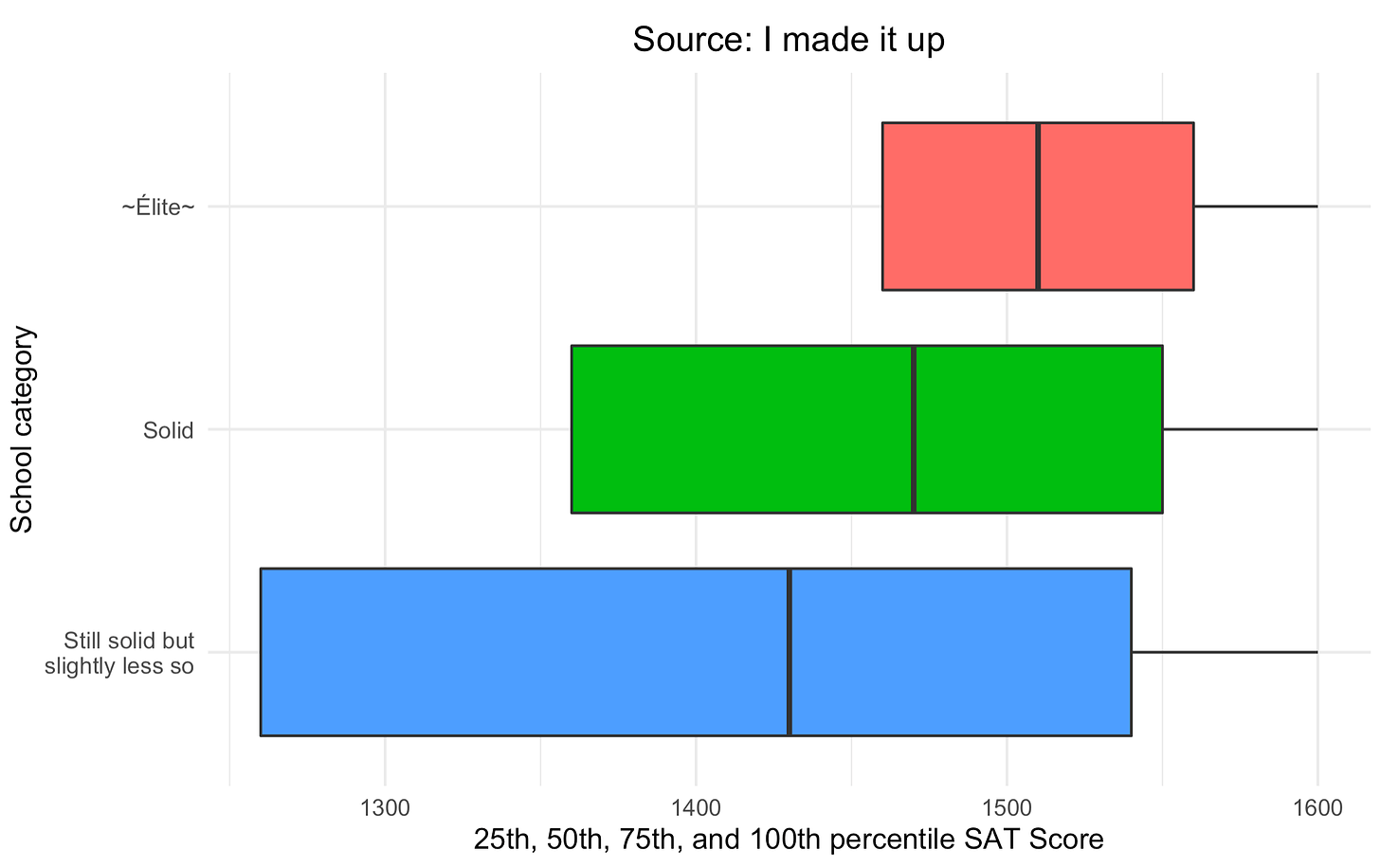
More explicitly, the lower-level points I’m trying to convey are that:
- I’m all but certain there are at least a few 1600-scoring students at all of the top, say, 30 U.S. colleges (and probably more than that)
- As we move down the rankings…
- 75th percentile SAT score falls very gradually
- Median SAT score falls a bit faster
- 25th percentile score falls faster still
It’s surprisingly hard to find graphing-quality data, but I did manage to make this (hideous, I know) chart with non-made-up data for, well, read the title…
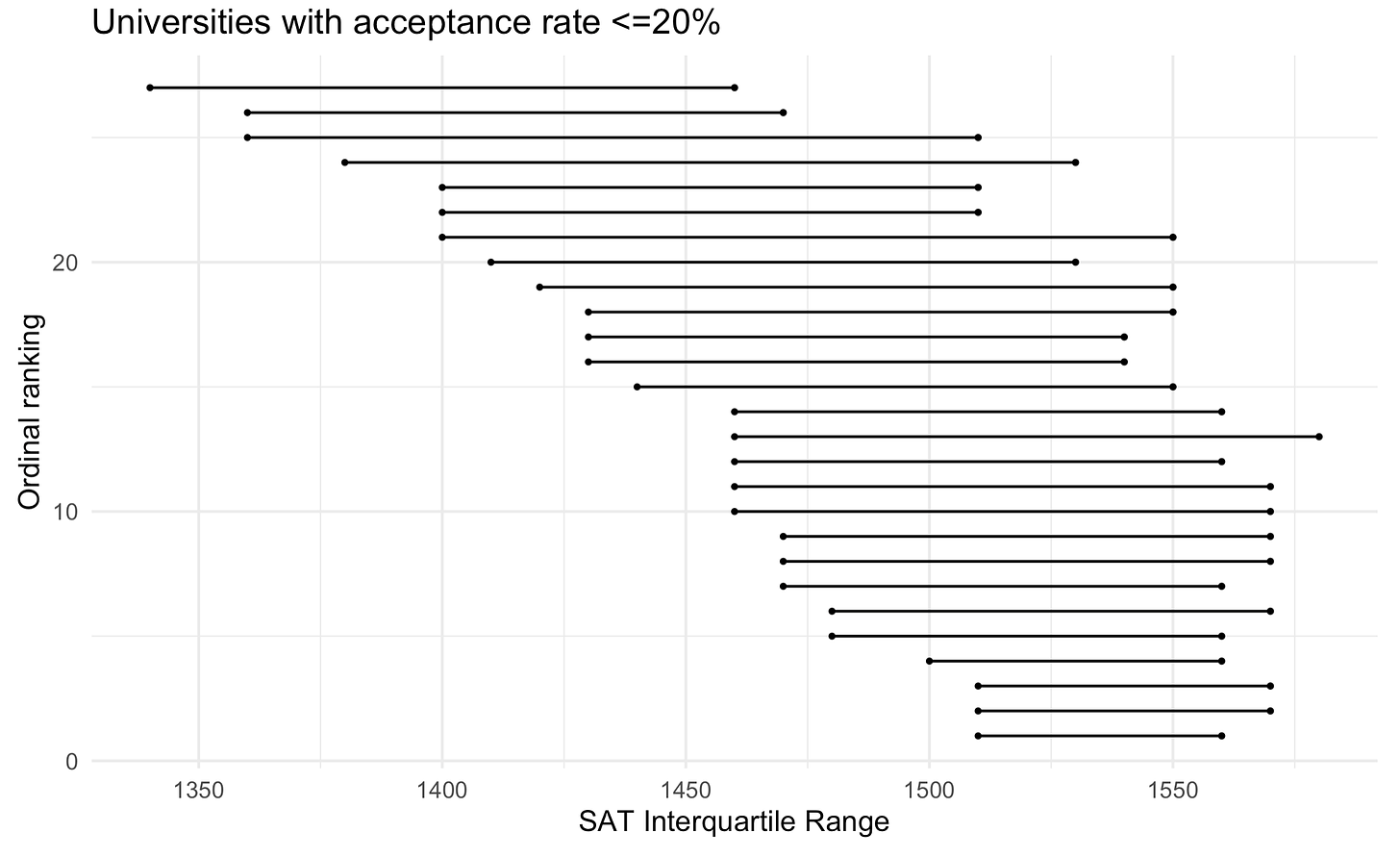
Conclusion
I have a bad habit of spending a ton of time on posts that never get haven’t yet been published, so I’ll avoid wasting both of our time reiterating the main points from the intro.
But I will emphasize once again that—as far as I can tell—there is a total lack of public data on applications by college, which stands in stark contrast to the cornucopia of statistics on college attendees by school.[6]
I don’t think it’s unhinged to suggest that this is simply because it’s not in colleges’ institutional interest to reveal how hard it is to get in. After all, high hopes→more applicants→more rejections→lower acceptance rate→move up in the all-important ~rankings~.
But it also clearly doesn’t help that doing what I’ve done in this post—that is, publicly lament how unfair life has been [recall from the intro: I don’t actually think this] because one’s high school academic success was followed by a string of Ivy rejections—is a little cringe. Well, consider this my sacrifice then, because the optimal amount of cringe is not zero.
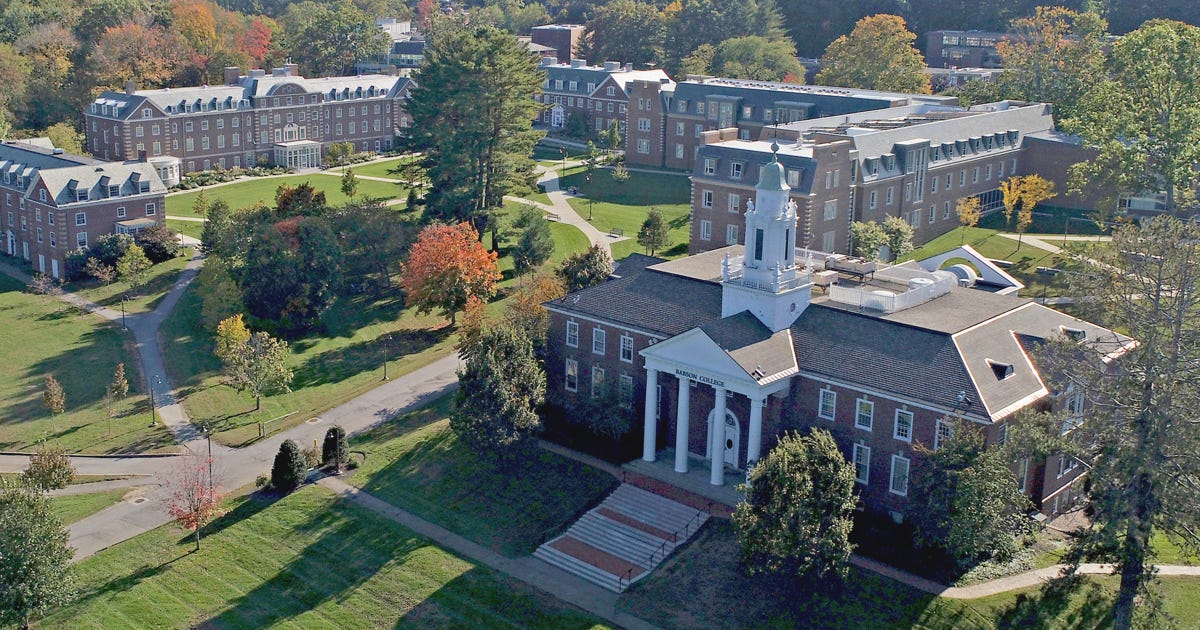
Edit: here's what Scott Aaronson commented on Substack:
Thanks so much for this post, Aaron!! It covers a lot that desperately needs to be better-known by nerdy kids in the US.
Story time: in 1997, I was rejected from all five of "HYPMS" despite a 1600 SAT and a single-author paper in a major computer science conference. (BUT: I was 15 years old, had uneven grades and no sports or music or "leadership," and indeed had "escaped" from high school early, getting a G.E.D. instead.) Once you understand how undergrad admissions work, this outcome wasn't surprising in the slightest, though at the time it felt like a death sentence.
I went to Cornell, one of two places (along with Carnegie Mellon) generous enough to admit me with this bizarre record. I got an excellent education there, and ended up at my first choice of PhD program (Berkeley).
Truthfully, in the long run the rejections may have helped me, by filling me with a burning motivation to do enough in science that someday the rejections would be a point of pride. And whenever I get depressed, I can tell myself that at least I can now cross that particular teenage fantasy off the list -- having, e.g., been tenured faculty at one of the same fine institutions (MIT) that rejected me for undergrad.
These days I run the Quantum Information Center at UT Austin, where almost every year I meet undergrads who I would've been thrilled to have at MIT.
I'm sharing this here because I hope some nerdy, academics-focused kid who feels like their life is over because they got rejected from HYPMS will read it, and it will mean something to them.

- ^
Eyeballing the scatterplots, it doesn’t look like setting an SAT threshold of 1570-1600 or ACT threshold of 36 would change the results. I kept it at 1560 to preserve a decent sample size.
- ^
More specifically, it depends on how similar each school’s acceptance process is (or, more technically, the covariance of each distribution)
- ^
Or proportion who are accepted to any top-tier school, but five seemed like a reasonable number for me to manually look at
- ^
My sister’s undergraduate home, which is why it jumped out to me.
- ^
And [very] hot and humid.
- ^
For hyper-contingent reasons, I have access to a small subset of individual-level data from Naviance, but that’s not saying much

I think EA should have organized outreach at each US state's top public university (or at least, most of the 50 top public schools by state). You mention two schools that perfectly illustrate this:
1. University of Texas at Austin:
You quoted Scott Aaronson that:
"These days I run the Quantum Information Center at UT Austin, where almost every year I meet undergrads who I would've been thrilled to have at MIT."
Well, UT is Texas's top public school (ranked #38 nationally).
Compare it to Texas's premiere private institution, Rice University of Houston: Rice is technically "better" (#17 overall), but UT is 10x the size of Rice (yes, 10x! So many more potential EAs!) and $40K cheaper for a Texan (compare here, and wait for it to load).
Also, people from the south clamor to attend Rice--it is known colloquially as one of "the Southern Ivys", and they pay the same as a native Texan. The incentives are such that more bright Texans will attend UT than Rice.
(FWIW, Scott's point of comparison, MIT, is also private!)
2. University of Maryland at College Park:
You name UMD in your post, as the example university with 25% of SAT scores as good as 75% of Harvard's.
Well, UMD is Maryland's top public school (#59 overall).
Again, comparing it to the private institution that "beats it", Johns Hopkins (#9 overall): UMD is 5x the size of JH and costs ~$50K less (compare here).
And people from all over America choose to attend JH (again, once you are looking at private institutions, location doesn't matter), so JH isn't really filtering for Maryland's best and brightest. If anything, it is filtering it out!
Conclusion:
While I guess just looking for public universities in the national rankings works roughly as well, I think this is illuminating for what is going on here. Private institutions probably do a good job filtering for the best of people who are willing and able to attend a private institution, and they do filter nationwide. But many students are not willing or able to even participate in that race (and much of the race is rigged anyway). A separate sorting is going on in each state via the public universities.
If EA wants to reach all of the best of the best, rather than 80/20ing it, we need to operate within both sorting systems (private and nationwide vs. public and state-wide). EA has probably neglected public/state institutions far too much.
Action:
-I wonder how EA can be seeded at some of these top state schools if they don't already have a group?
-I really appreciate all the gorgeous data in this post, and would love to see some comparing private to public universities
-Does this also apply to top schools by country compared to global listings? For example, should there ideally be outreach at each top uni for each European country rather than looking at the overall best schools in Europe? America is an outlier for comparing the prestige of our private unis vs our public unis, but it might still apply.
I don't think the relevant value here is P(goes to school | smart person). I think it's P(smart person | goes to school). The latter seems much higher for Ivies (Ivies = top ranked schools) than anywhere else, except places that excel in a certain area (e.g., CMU, although this might also be top ranked).
I think the most obvious use case is EA recruitment/outreach, particularly for tasks that smart people are in theory better at (e.g. technical research most clearly, but I think many other tasks too).
P(smart person | goes to school) seems most important for choosing whether you want to do campus outreach programs in university A vs university B. But P(goes to school | smart person) is relevant for the relative weighting of campus outreach vs. other programs that doesn't rely on this pre-filter.
If there's a lot of smart people outside of elite universities, you might want to differentially do more EA outreach that captures this market (e.g. online outreach, EAGs, or retreats/conferences that have their own selection process that don't piggyback on elite university outreach) . If there aren't, then you don't want to do this.
I agree. I think it's also worth pointing out that P(smart person|goes to school X) is a different metric from Count(smart person|goes to school X) (the total number of people matching some criteria). One takeaway I got from the post is that while the probabilities might still be different between schools ("75th percentile SAT score falls very gradually"), the number of "smart" students might be comparable at different schools because many non-elite schools tend to be larger than private elite schools (further, since there are also many more non-elite schools, I might expect Count(smart person|goes to non–elite school) >Count(smart person|goes to elite school) but that's besides the point).
Practically, for EA outreach, this maybe implies that university outreach might be harder at big non-elite-but-still-good schools: as Joseph points out below, the median student might be less qualified, so you'd have to sample more to "sift" through all the students and find the top students. But EA outreach isn't random sampling—it appeals to certain aptitudes, can use nerd-sniping/self-selection effects, and can probably be further improved to select for the most smart/agentic/thoughtful/truth-seeking/whatever you care about students, and there might be a comparable number of those at different universities regardless of elite-ness. If the heavy tail of impact is what matters, this makes me update towards believing EA outreach (and students starting EA groups) at non-elite-but-still-good universities could be as good as at elite universities.
A convenient way to sift is focusing on honors colleges within universities - there is some discussion on that here.
The smartest people will always gravitate toward the EA group, you don’t actually have to sift through all the students to find them.
You might no longer endorse it, but I (in a weaker form) do!
I'd bet there's a positive correlation between SAT/IQ/whatever and, say, the dummy variables "has completed intro EA fellowship" controlling for campus attended
Though my intuition and credence is way stronger for more normal, bigger school with high SAT variance than top 10 unis and small liberal arts colleges.
To be clear the reason I unendorsed this comment is that I think it was covered in the comment I was replying to and it was very bad on my part not to read the comment fully and coherently before replying. Checking the EA forum when I’m dead tired isn’t the best idea.
I’m curious why you believe this
Hmm, I think it depends on what the relevance is for. What do you have in mind?
If we set aside the social jockeying and ego boosting, to me the obvious relevance is for hiring/selecting employees. The primary reason I would care whether or not somebody went to a fancy school would be dependent on to the extent that this information can tell me whether or not they would be successful in a particular job I am hiring for. To the extent that it is predictive of success on the job, then I'd want to know.
My gut tells my that it is only slightly helpful, but I don't have any evidence to support that gut feeling: I think that there are few idiots at the Ivy Leagues, but there are lots of smart people outside of the Ivy Leagues. My rough mental model is that if I were to filter job candidates based on school ranking and look only at candidates who attended the top 25 or top 50 schools, then I would successfully eliminate some bad fit candidates (in a simplistic model in which we can condense success on the job down to a single metric, maybe I'd eliminate the bottom 10%). But I suspect that I'd also end up eliminating a lot of really good candidates from the top 50%.
Probably something like how much effort should be spent on building EA groups at said University. I agree with the examples Linch gives for where this wouldn't be relevant.
This post irked me because I think it's wrong if you raise the bar for what "Ivy-smart" means. If it means something like "being good at an academic thing on a national (or even state) level" then I think most of these people are at Ivy League schools. For example, I know ~40 people who went to Olympiad training camps or were finalists in research contests, and pretty much all of them other than one or two are at top 10 schools. As another example, one competitive math research program list its results for alumni:
This research program I think is considered around as tough to get into as making the national math Olympiad.
I'm estimating there are maybe 5,000 - 10,000 people who would qualify as being good at something on the national level per four year groups (how I'm getting this estimate - good at national level = top 500 in something, there are maybe 10ish academic areas, and each of this has 1-2 ways to be good. For example, for sciences there are olympiads and research, for CS there's CS research and building impressive projects, etc. ) Meanwhile, after a quick google search there are about 24,000 who would get a 150+ SAT score. It seems to me that there are a lot of people who are great at something on a national level that don't know what EA is. Maybe enough that we should focus on Ivies significantly more than anywhere else?
As others have said, this really depends on what the context is. If we're choosing how much money to spend on which University groups, and all University groups have around equal need for money, I'm guessing that the vast majority of the money should go towards Ivy University groups.
I briefly looked into this. Of the 22 Fields medalists since 2002, X went to undergrad at elite US universities, Y went to non-elite US universities, and Z went to non-US universities.
Please register your predictions for what numbers should fill X, Y, and Z.
[...]
[...]
The answers are 1 (Harvard), 0, and 21, respectively. So the evidence does maybe weakly support investing in elite US universities over non-elite US universities, but pretty weakly. A far more important point seems to be that many people with outlier talent on this dimension are neither American nor come to the US as undergrads.
I'd like to see this foray replicated for metrics of top ex post performance in physics, CS, and entrepreneurship.
[Shortform version of this comment here.]
Update: I helped Linch collect data on the undergrad degrees of exceptionally successful people (using some of the ex post metrics Linch mentioned).
Of the 32 Turing Award winners in the last 20 years, 6 attended a top 10 US university, 16 attended another US university, 3 attended Oxbridge, and 7 attended other non-US universities. (full data)
Of the 97 Decacorn company founders I could find education data for, 19 attended a top 10 US university, 32 attended another US university, and 46 attended non-US universities (no Oxbridge). (full data)
So it seems like people who are successful on these metrics are pretty spread out across both US/elsewhere and elite/non-elite unis, but concentrated enough that having considerable focus on top US universities makes sense (assuming a key aim is to target people with the potential to be extremely successful).
The concentration gets a bit higher for PhDs for the Turing Award winners (28% at top 10 US universities). It’s also higher for younger Decacorn company founders (e.g., 50% of under-35s in the US at MIT or Stanford) – so that gives some (relatively weak) evidence that concentration at top US universities has increased in the last few decades.
There’s a doc with more details here for anyone interested.
Wow awesome analysis! Haven't read super carefully just yet but does seem to point in the opposite direction of the evidence I present insofar as it relates to uni CB. I think this would be worth making a normal high-level post! Blame it on me and link this comment if anyone disagrees lol
My only super brief thought, which I don't think is controversial but I'll make explicit, is that reverse causality (i.e. Stanford signal->success metric) is one reason you might not want to take this as knockdown evidence in favor of "Ivies select for talent," though I really don't have a great guess as to how much this is indeed the case
Two very quick notes:
Edited to add: my MS and MA are from a less elite school (UCSD). I've tried to convince more of my friends from UCSD to apply to jobs at Open Phil than I have Caltech friends.
Thanks for writing this. I see this as one more argument to lessen the common idea of "I accomplished this, I deserve credit" and to increase just a little bit more the idea of "I am very fortunate to have been born in a particular family/society/decade, and a fair chunk of my success is simply due to luck and circumstance." I try to adopt the later view often, and I find it challenging to see so much emphasis in EA on famous universities.
Lucky people maybe just have an easier time doing anything they want to do, including helping others, for so many reasons.
I didn't go to an elite university but I am exceptionally lucky in so many extreme ways (extremely loving family, friends, citizen of a rich country, good at enough stuff to feel valued throughout my life including at work etc).
While there is a counterfactual world where of course I could have put myself in a much worse position, it would have been impossible for most people to have it as good as I have it even if they worked much harder than me their entire lives.
Because of my good luck, it is much easier for me to think about people (and other sentient beings) beyond my immediate friends and family. It is very hard to have a wide moral circle when you, your friends and your family are under real threat. My loved ones are not under threat and haven't ever been. I care a tonne about the world. Clearly this is largely due to luck. I have no idea what I would have become without a life of good fortune.
I think it makes sense to try and find people who are in a position to help others significantly even though it is always going to be largely through luck. Things just are incredibly unfair. If they were fairer, effective altruism would be less needed.
It's probably easier to find people who are exceptionally lucky at elite universities.
I do think it makes sense to target the luckiest people to use their luck as well as possible to make things better for everyone else.
The challenge is doing this while making sure a much wider variety of people can feel a sense of belonging here in this community.
I do think we have to be better at making it clear that many different types of people can belong in the effective altruism movement.
Who should feel welcome should they stumble upon us and want to contribute is a much, much larger group of people than to whom should we spend scarce resources promoting the idea that lucky people can help others enormously.
I think part of the answer comes from the people who don't fit the mould who stay engaged anyway because they resonate with the ideas. Because they care a tonne about helping others. These people are trailblazers. By being in the room, they make anyone else who walks in the room who is more like them and less like the median person in the existing community feel like this space can be for them too.
I don't think this is the full answer. Other social movements have had great successes from making those with less luck notice they have much more power than they sometimes feel they do. I'm not sure how compatible EA ideas are with that kind of mass mobilisation though. This is because the message isn't simple so when it's spread on mass, key points have a tendency to get lost.
I do think it's fair to say that due to comparative advantage and diminishing returns, there is a tonne of value to building a community of people who come from all walks of life who have access to all sorts of different silos of information.
Regardless, I think it's incredibly important to not mistake the focus on elite universities for a judgement on whether they deserve to be there.
I think it is actually purely a judgement on what they might be able to do from that position to make things better for everyone else.
Effective altruism is about working out how to help others as much as we can.
If lucky people can help others more, then maybe we want to focus on finding lucky people to make all sentient beings luckier for the rest of time. If less lucky people can help more on the margin to help others effectively, then we should focus our efforts there.
This is independent of value judgements on anyone's intrinsic worth. Everyone is valuable. That's why we all want to help everyone as much as we can. Hopefully we can do this and make sure that everyone in our community still feels valued. This is hard because naturally people don't feel as valued because we all tie our instrumental value to our sense of self-worth even if instrumental value is usually pretty much entirely luck. This is a challenge we maybe need to rise to rather than a tension we can just accept because a healthy, happy effective altruism community where everyone feels valued will just be more effective at helping others. I think it's pretty clear that everyone can contribute (e.g. extreme poverty still exists and a small amount of money still sadly goes a very long way). I know I can contribute much, much less than many others but being able to contribute something is enough. I don't need to contribute more than anyone else to still be a net positive member of this community.
We're all on the same team. It's a good thing if other people are able to do much more than me. . If luckier people can do more, then I'm glad that they are the ones that are being most encouraged to use their luck for good. If those with less luck want to contribute what they can, I hope they can still feel valued regardless.
Hopefully we can all feel valued for being a part of something good and contributing what we can independent of whether luckier people are, due to their luck, able to do more (and therefore might be focused on more in efforts to communicate this community's best guesses on how to help others effectively).
I’m in general perfectly willing to draw distinctions in between different “tiers” of universities, but I have to say, as an ~Ivy League Person~, the notion that students at Georgetown (or Northwestern, UCLA, Johns Hopkins, Duke, WashU, UMich, UVA, etc.) might generally be of lower caliber than students on Ivy League campuses has literally never crossed my mind, nor is it one I would have guessed that more than a trivial number of other people in highly educated communities would endorse. I may be wrong, but I’ve really never thought I was particularly progressive in this respect. I’ve always understood the view supported by the data/graphs in this post to be the conventional one.
Huh, interesting and thanks for sharing.
Completely the opposite, though, I do think that the average student at, say, Yale is indeed smarter than the average Georgetown student to a non-trivial degree, and I never seriously considered that this might not be the case.
Like, I guess, if pressed, I’d concede that maybe the mean at Yale is a little higher than the mean at Georgetown, but I’d also assume this should be attributed almost entirely to a handful of outliers in the distant right tail of the distribution at Yale and that the rest of the two schools’ distributions overlap nearly in their entirety. [referring here to imaginary distributions of “true g,” not to distributions of standardized test scores]
Thanks very much for sharing this, and in particular the fascinating charts. I was pretty surprised at how large a fraction of successful applicants were, on these axis, strictly dominated by other rejected applicants, and how large the overlap was in the box and whiskers plots. Sometimes colleges argue they can't just look at SAT because they have more applicants with perfect SATs than they have spaces, but that doesn't explain why you would almost all your successful applicants (from this school) would have sub-perfect SATs.
I have have thoughts that could perhaps change the conclusion:
It's well known that colleges care a lot about extracurriculars. If these really are a good sign of flexibility, work ethics, initiative and so on, perhaps we should care about them also. If so, colleges might be correctly adjusting, the low correlations we observe in the charts are just because we can't directly observe those facts, and high quality people are more concentrated in top schools than this data would suggest.
Additionally, SCOTUS is due to hear Students For Fair Admissions vs Harvard later this year, and Metaculus currently gives them a 75% chance to successfully get racial discrimination in university admissions found unlawful. If so the correlation with SAT/GPA might improve a lot after this year, so the phenomena you're highlighting might be a relatively short-lived one.
If the SATs are normed to a lower level, you might expect that doing perfectly on them might not be super predictive of outlier ability, compared to just doing extremely well.
Analogously, imagine a test for Alzheimer's with 100 questions. Even if most people without Alzheimer's only get <90/100 questions right on them, we might not expect there's that much extra predictive validity between 99 and 100 right. (see also).
Lazy, unsolicited feedback: I wanted to read the high-level takeaways from this post without reading more than >30% of the entire thing, but it was hard. Maybe you could consider starting with a TL;DR, rather than caveats? :)
Added, thanks for the suggestion!
I love unsolicited feedback (not being sarcastic haha)!,
Yeah idk why adding TL;DR didn't cross my mind. Will to get on that soon, thanks
I want to appreciate you on the meta level here that I'm happier to see meta posts about EA that have a bunch of data you dug through. The posts I plan on writing soon don't, but I'm excited for more that do!
Great post; I'd note that while you focus on arguing that the correlation between Ivy admissions and intelligence is lower than one might naively expect, the statement "most Ivy-smart students aren't at Ivy-tier schools" is also a trivial consequence of the fact that these schools collectively admit very few people and there are plausibly at least twice as many "Ivy-smart" applicants each year as there are spots at Ivies.
In a sane system, you might expect that this will mean that the "Ivy-smart" criterion gets redefined to be at a substantially higher bar.
This assumes that the task of differentiating Ivy Smart+ applicants from mere Ivy Smart applicants is an efficiently solvable screening problem. I think it very likely isn’t and that the costs (to both universities and their applicants) of reworking the application process so that it could reliably distinguish the 99.5th percentile (by intellect) of high schoolers applying to college nationally from the 99th percentile of that group would be unacceptably high. (Notably, the SAT/ACT can’t solve this problem — they’re noisy on the order of several percentiles.)
I'm not sure, but I feel like the majority of other large countries managed to solve this problem without that much fuss (gaokao, IIT-JEEs, etc, all seem to have higher skill ceilings). That said, they tend to measure knowledge more than raw intellect, which is maybe bad from an EA perspective since it forces hyperoptimization on established paradigms.
I don't have anything approaching a clear sense of how sensitive & specific the gaokao, IIT-JEEs, etc. are at detecting extraordinary intellect, but I will say that, yeah, I have not heard good things about the incentives that those exams create for students seeking admission to university. Even in places like France, where access to higher education is much less competitive (and much less high-stakes) than in China or India, the baccalauréat seems like it distorts students' incentives in pretty unproductive directions. Whether or not that makes it worse than the current system in the U.S., I don't know.
Thanks for writing this! A couple days I was also wondering "🤔 could I use janky-statistics to estimate how the number of top N% most 'promising' students at X small elite private university compares to Y large non-elite public university?" But I'm glad you used non-janky statistics to evaluate this much better than I would have.
I'll add a few more ways this could be wrong:
I'm not sure how much to believe some of these, and some of them being right could mean the point presented in the post is not strong enough and there could be more "promising" students at non-elite universities than elite ones. Either way, I think it's reasonable to update away from assuming EA outreach and community building should be focused on elite schools (if you're a student at a non-elite school reading this, consider learning more about EA, getting mentorship, and starting a university group!).
EA's obsession with elite universities is sickening and this is just reason #283 why.
I think this post argues that people shouldn't obsess about elite universities as sources of talent. My paraphrasing of the title is "Most super smart students aren't at super elite schools."
Yup, to clarify I meant that the arguments in the post are another reason why EA's obsession with elite universities is sickening. Reading it back I see the ambiguity...
That said, I think even the OP accepts the premise that there is a high return to having lots of high-SAT-score people in EA. Most charitably, this is a high return to having lots of high-IQ people since the SAT-IQ correlation is decent. But I think the returns to lots of high-IQ people in EA are also pretty modest and it's much more important to get people with varied perspectives/skills into EA. Someone who is average IQ but high EQ could do a lot of good for EA as a communicator, community-builder, etc.
I appreciate that many EA's focus on high IQ and general mental ability can be hard to deal with. For instance, I found this quite aversive when I first got into EA.
But I'm unsure why your comment has 10 upvotes, given that you do not give many arguments for your statements.
Please let me know if anything below is uncharitable of if I misread something!
Focusing on elite universities
The share of highly talented students at elite universities is higher. Thus, given the limited number of individuals who can do in-person outreach, it makes sense to prioritize elite unis.
From my own experience, Germany has no elite universities. This makes outreach a lot harder, as we have no location to go to where we can be sure to address many highly talented students. Instead, German EAs self-select into EA by finding information online. Thus, if Germany had an elite uni, I would put most of my outreach efforts there.
Returns to high IQ
If you condition on the view that EA is bottle-necked by highly engaged and capable individuals that start new projects or found organizations, selecting for IQ seems as one of the best first steps.
IQ predicts good performance among various tasks and is thus plausibly upstream of having a diversity of skills.
E.g., a 2011 study of 2329 participants in the Study of Mathematically Precocious Youth cohort shows no cut-off at which additional cognitive ability doesn't matter anymore. Participants were identified as intellectually gifted (top 1% of mental ability) at the age of 13 years and followed up for 25+ years. Even within this top percentile stratum of ability, being in the top quartile predicts substantially better outcomes: Among the top 0.25%, ~34% of cohort participants have a doctorate, and around 12% have filed a patent 25+ years after being identified as gifted at the age of 13. This compares to 4.5% of the US population holding a doctorate degree in 2018; I couldn't find data on the share of US Americans who have filed a patent, but I wouldn't be surprised if it's at least one order of magnitude lower.
Value of different perspectives/skills
Looking at the value of I) varied perspectives and II) skills in turn.
Regarding I), I'd also want to select people who reason well and scrutinize widely held effective altruist assumptions. But, I wouldn't aim to maximize the variety of perspectives in EA for the sake of having different views alone (as this doesn't account for the merit of each view).
And again, generating perspectives with lots of merit is likely linked to high IQ.
On II), I agree that having EAs with various skills is important given that EA-oriented work is becoming increasingly diverse (e.g., doing AI Safety Research, building pandemic shelters, drafting legislation that governs x-risks).
Since two comments have understood me as claiming that intelligence doesn't matter in general, I think I just communicated my point very badly. I accept the general arguments that intelligence matters for people's achievements and such. My claim is that EA as a movement requires all kinds of skills, not just analytical intelligence.
This is not my sense of the bottlenecks in EA. I have the impression that EA has a lot of analytically intelligent people already and is bottlenecked by communicators, organizers, etc - people who have strong social and emotional skills and can grow EA as a movement. But if you are right that this is the most important bottleneck it is, then I would agree that selecting for high IQ individuals is a pretty good step.
That makes sense; thanks for expanding on your comment.
I was under the impression that the Max Planck Society and Helmholtz Association are fairly comparable to elite universities in the US or GB in most but being called university.
Agreed that their research is decent, but they are post-graduate institutes and have no undergraduate students.
Returns to intelligence are very large, thanks to the heavy-tail nature of most tasks due to being log-normal or power law distribution, not a normal distribution. From Gwern on human intelligence:
My claim is not about the returns to high IQ in general, but about the returns to high IQ in EA. It's about the value of intelligence as a criterion that we use to reach out to EAs. I think EA places an incredibly high premium on analytical intelligence right now, which is justified given the advantages you point out. But EA is a movement that needs all kinds of people, and in particular it needs capabilities that may be completely orthogonal to analytical intelligence. I gave the example of how intelligence may be much less important than EQ/emotional intelligence for someone who is doing community building or communicating EA to a larger audience.
I think you understand me as staking a claim in this larger debate about human intelligence. I am not.
Thank you, I'll remove the downvotes. On priors a lot of discussion on this topic tends to go bad places fast, so I wanted to head that off.
One other thing I think is somewhat relevant here is that among really smart students, ivies primarily select for well-roundedness, ie doing a lot of volunteer work, being really committed to a hobby, etc., rather than simply being good at and focused on schoolwork. I think there is some argument that these things yield better EAs (they may be less likely to feel like their path is directly toward academia), but I think well-roundedness is in general unfavorable in EA. Dedicating your life towards an intellectual community requires a high degree of commitment toward intellectualism, rather than simply seeing intellectual work as a part of your life but not where you derive most of your purpose or joy.
I think well-roundedness is maybe unfavorable for some EAs (mainly in academia), but not for a majority of EAs.
My experience from observing some of my most successful friends in non-EA orgs (policy roles, consulting, PE etc.) is that well-roundedness is a good predictor of success. Of course, no scientific proof, but you can imagine that abilities as quickly understanding social norms, showing grit, and manoeuvring in complex social (not purely intellectual) environments help you in those careers. These are things that you (partially) practice and learn in sports, board roles and some type of work you can do in college.
I think Excellent Sheep by Deresiewicz mentions that very selective institutions are looking for "pointy circles" - e.g., better than average in most things with one particularly standout trait. It's been a while since I read it, so I think it might be looking over again with a critical eye toward the stats.
Also, well-roundedness, at least from word-of-mouth from someone involved in medical school admissions at a top 25 medical school, is used to proxy "effortlessness" rather than passion, i.e., someone who can handle much more work than average without burning out. From peers that look at their college admissions folder, there tends to be selection for filling a certain niche on campus (e.g., this person will probably lead a cultural club, this one is likely to join this niche club, etc.). So in some ways, it actively selects against students who primarily want to pursue high impact careers.
My sense is that this is a common misconception. As far as I can tell, volunteering+sports+other extracurriculars that don't literally reach the national or international level are kinda like a 1560 SAT - good enough for the second tier, not the first.
And I hesitate to share because it seems to violate like six social norms , but whatever; when I was applying to college, I had a few well-roundedness points:
Edit: I'm weak and succumbing to the norms :( Blurred text instead:
Oof, feel like I'm applying to college again lol
I mean, I’m happy to see data that proves me wrong, but I wouldn’t extrapolate from your individual case. Obviously extracurriculars + 1560 SAT arent a free ticket to harvard, but I still think the primary differentiator between smart kids that get into Ivies and those that don’t (beyond affirmative action) is how involved they are in extracurriculars.
Oh yeah I totally agree, but not in the "well roundedness" sense. Like "Olympian" or "world's best youth chess player" would be seen more favorably than a laundry list of less-dramatic things
Right this is always a spectrum but I don’t think “Olympian” is the best cutoff here, I think “been doing this thing since I was five and am now nationally ranked” or “started some local volunteer (not school) organization” is a better description here. Honestly I would expect your rock climbing thing to reflect pretty well and am somewhat surprised that it didn’t get you anywhere, though I think getting into Georgetown is not exactly a rejection of your qualifications :)
:) thank you, and for sure I feel very fortunate to be accepted there and am very glad I went!
Good points. An important point to bear in mind though is that once again well-roundedness, volunteer work, hobbies etc are all related to factors apart from motivation/ability. Generally, people from wealthier backgrounds have much more of these on their resume than people from poorer backgrounds because they could afford to take part in the hobbies, could afford to work for free, etc. Lots of supposedly 'academic filtering' is actually just socioeconomic filtering with extra steps.
In the graphs, it looks like all the GPAs are above 4.0. How is this possible? I thought that 4.0 was the maximum GPA, and if you got 100% on all tests and papers and homework in every single class, then you would get a 4.0 GPA? Am I misunderstanding how GPA works nowadays? Does that high school use some kind of a special grading system?
AP classes are sometimes graded on a 5.0 instead of 4.0 scale. A lot of high schools do this but not all of them do. Basically it's a way of rewarding students for taking harder classes.
Our kid graduated HS in 2012. They and their best friend both got rejected from Stanford, while a classmate who was a legacy with significantly lower grades, SATs, and extracurriculars got in. It was fine; the friend went to MIT and EK went to Pomona (which is FANTASTIC OMG).
More: https://www.mattball.org/2016/04/ellen-stalwart.html